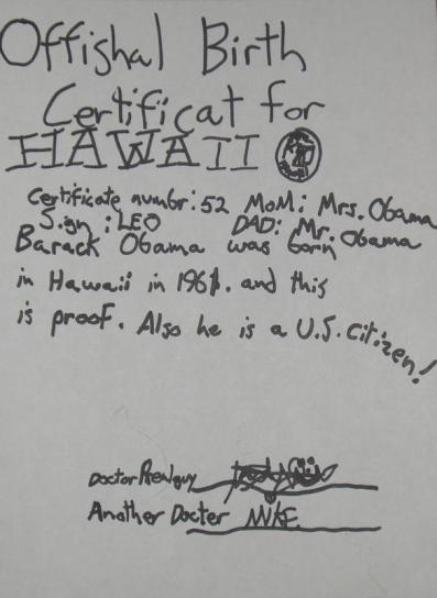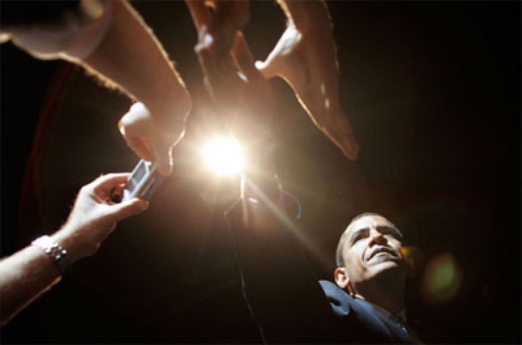
The Danish philosopher Søren Kierkegaard once defended the proposition that every statement suggests its opposite. Others have expressed a similar skepticism concerning the trustworthiness of words, especially when those words are not backed by action. From Shakespeare ("The lady doth protest too much, methinks") to Emily Dickinson ("A word is dead/When it is said"), our great writers have always been suspicious of flowery words.
Modern political history offers plenty of examples of words that suggest their opposite. For many who watched the speech, Richard Nixon's insistence that he was "not a crook" immediately heightened the suspicion that he was. Bill Clinton's finger-wagging denial of ever having had "sex with that woman" only whetted public curiosity to find out what he had been doing with that woman.
Taxing and spending may not be sexy, but in fact they are far more scandalous activities than those engaged in by Presidents Nixon and Clinton. They are scandalous because unlike the foibles of his predecessors, Obama's bad judgment will affect the life of every American, including those yet unborn. Unlike the failings of his predecessors, Obama's fiscal recklessness affects what we are and what we shall be for generations. Shall we be a rich and powerful nation with a strong and trusted currency and prosperous markets -- or an unproductive nation dependent on the fiscal dictates of others? Shall we be a nation of affluence and opportunity, or a nation of beggars housed in public shelter, fed with food stamps, heated and clothed with vouchers, educated in dysfunctional schools, and treated within an overcrowded, government-regulated medical system? The choice depends on whether government is able to restrain its spending.
Certainly, Obama wishes to appear to be a fiscally responsible president who will both lower the deficit and hold the line on taxes. He is loud and insistent, even to the point of browbeating opponents, about controlling spending and not raising taxes. But as Kierkegaard, Shakespeare, and Dickinson understood, "not one penny" is one of those phrases meant to disguise the speaker's intention. It is a classic example "the big lie," a falsehood so outrageous that it cannot easily be challenged. It is, in fact, a rhetorical trick to which Obama frequently resorts.
"Raising taxes next year," says the president, "would be the wrong thing to do." Why would it be the wrong thing to do next year if it is necessary in future years? Does it have anything to do with the November election? What about every year after 2010? The American people recognize lawyerly speech when they hear it. As the American people grow weary of Obama's deception, the moment of truth may finally catch up with him. That is the moment when bluster, deception, and denial no longer work.
With each week that passes, the president's assurances that "spending is saving" ring more hollow. At some future press conference, during some tense interview or angry speech, the moment will surely arrive when the president glowers angrily at the camera and insists that "I am not a wastrel." And at that point, everyone in America will know that he is.
From the American Thinker
Modern political history offers plenty of examples of words that suggest their opposite. For many who watched the speech, Richard Nixon's insistence that he was "not a crook" immediately heightened the suspicion that he was. Bill Clinton's finger-wagging denial of ever having had "sex with that woman" only whetted public curiosity to find out what he had been doing with that woman.
Taxing and spending may not be sexy, but in fact they are far more scandalous activities than those engaged in by Presidents Nixon and Clinton. They are scandalous because unlike the foibles of his predecessors, Obama's bad judgment will affect the life of every American, including those yet unborn. Unlike the failings of his predecessors, Obama's fiscal recklessness affects what we are and what we shall be for generations. Shall we be a rich and powerful nation with a strong and trusted currency and prosperous markets -- or an unproductive nation dependent on the fiscal dictates of others? Shall we be a nation of affluence and opportunity, or a nation of beggars housed in public shelter, fed with food stamps, heated and clothed with vouchers, educated in dysfunctional schools, and treated within an overcrowded, government-regulated medical system? The choice depends on whether government is able to restrain its spending.
Certainly, Obama wishes to appear to be a fiscally responsible president who will both lower the deficit and hold the line on taxes. He is loud and insistent, even to the point of browbeating opponents, about controlling spending and not raising taxes. But as Kierkegaard, Shakespeare, and Dickinson understood, "not one penny" is one of those phrases meant to disguise the speaker's intention. It is a classic example "the big lie," a falsehood so outrageous that it cannot easily be challenged. It is, in fact, a rhetorical trick to which Obama frequently resorts.
"Raising taxes next year," says the president, "would be the wrong thing to do." Why would it be the wrong thing to do next year if it is necessary in future years? Does it have anything to do with the November election? What about every year after 2010? The American people recognize lawyerly speech when they hear it. As the American people grow weary of Obama's deception, the moment of truth may finally catch up with him. That is the moment when bluster, deception, and denial no longer work.
With each week that passes, the president's assurances that "spending is saving" ring more hollow. At some future press conference, during some tense interview or angry speech, the moment will surely arrive when the president glowers angrily at the camera and insists that "I am not a wastrel." And at that point, everyone in America will know that he is.
From the American Thinker


















No comments:
Post a Comment